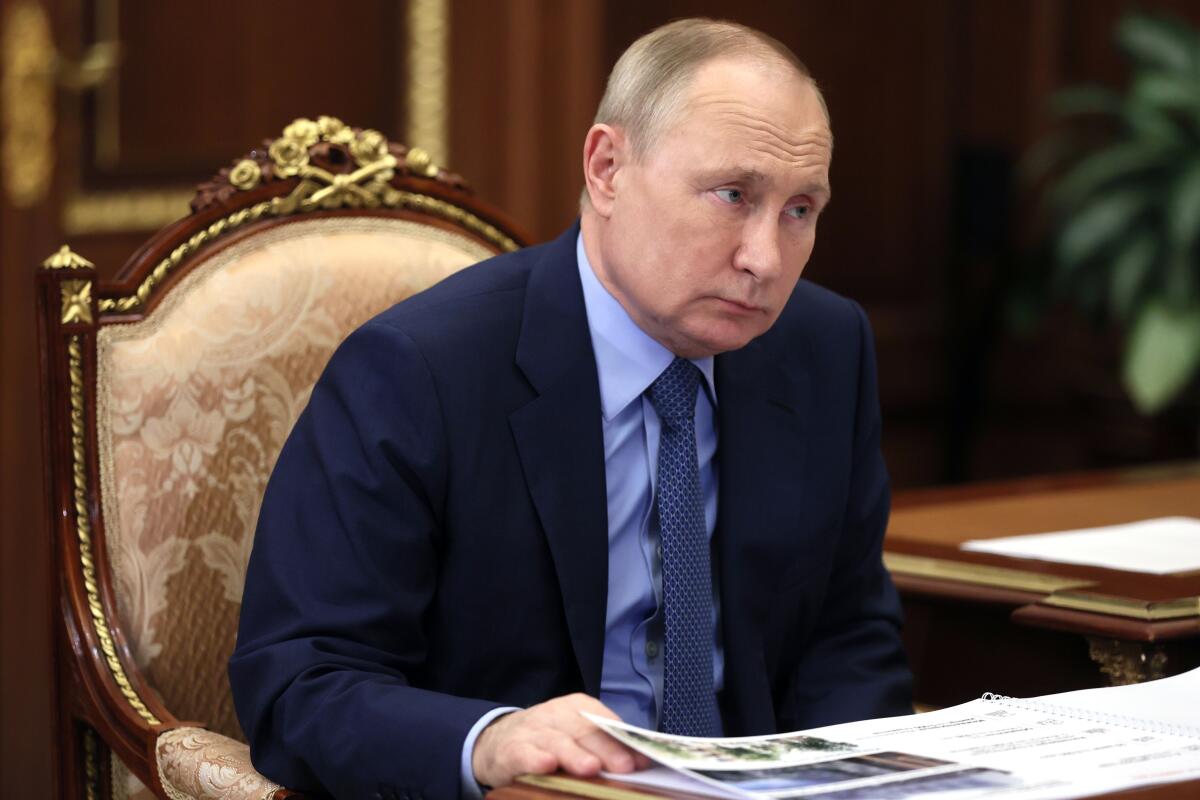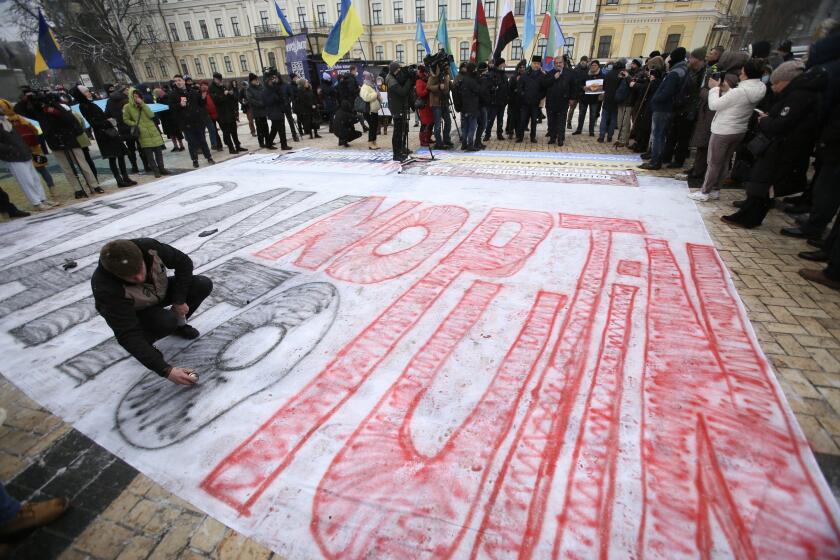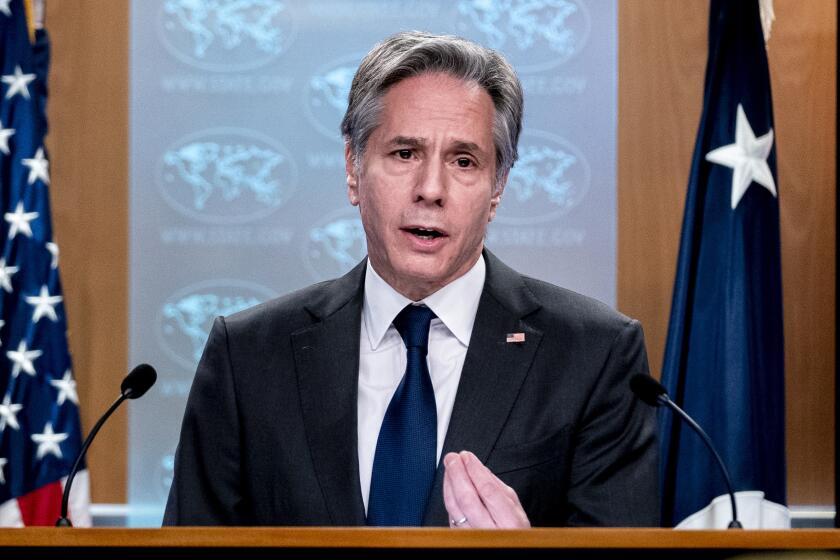U.S. says Russia preparing ‘false flag’ operation as pretext to invade Ukraine

- Share via
WASHINGTON — Reverting to a familiar “playbook,” Russia is plotting a pretext to invade Ukraine, a “false flag” operation that would justify its actions despite a week of intense U.S.-Russia negotiations that apparently failed to move Moscow away from a scheme of regional aggression, U.S. officials said Friday.
The White House also said Moscow is using social media to mount a disinformation campaign that portrays Ukraine, a former Soviet republic interested in joining Western alliances, as an aggressor that would attack Russia and must be tamed.
“We are concerned that the Russian government is preparing for an invasion in Ukraine that may result in widespread human rights violations and war crimes should diplomacy fail to meet their objectives,” White House Press Secretary Jen Psaki said Friday.
She said that laying the pretext included sabotage activities in addition to the disinformation campaigns.
On Friday, Ukraine reported cyberattacks on about 70 government and other websites, shutting them down temporarily. It was unclear who was responsible, but a top aide to Ukrainian President Volodymyr Zelensky framed the incidents as part of efforts to “destabilize” the country.
NATO Secretary-General Jens Stoltenberg pledged access for Ukraine to the alliance’s malware information-sharing platform.
Russia invaded Ukraine in 2014 and occupied its Crimean peninsula following a similar series of propaganda efforts. Moscow is also backing separatist rebels in eastern Ukraine fighting government forces, a simmering conflict that has claimed thousands of Ukrainian lives.
In recent months, Russia has amassed some 100,000 troops along its border with Ukraine and moved heavy weaponry in behind the manpower. There were reports of live-fire exercises during the last week.
“We saw this playbook before,” Psaki said.
Citing fresh U.S. intelligence reports, Psaki said Russia has already dispatched operatives trained in urban warfare who could use explosives to carry out acts of sabotage against Russia’s proxy forces — blaming the acts on Ukraine — if Russian President Vladimir Putin decides he wants to move forward with an invasion.
Pentagon spokesman John Kirby described the intelligence as “very credible.” The intelligence findings suggested that a military invasion could begin between now and mid-February, experts said, in part with a view toward a deepening winter that freezes the muddy plains between the two countries and makes it easier for Russia to move heavy equipment into Ukraine.
Stash food and cash, Facebook-unfriend Russia nationalists: yes. Learn that bomb shelter map: maybe. Ukraine hopes for best and readies for the worst.
The dire allegations about Moscow’s intentions, which came from across the administration — the State Department and Pentagon as well as the White House — marked a jarring coda to what had been a week of relatively civil if inconclusive diplomatic sessions involving the U.S., Russia, NATO and most of Europe.
Senior U.S. diplomats’ meetings with Russian officials in bilateral venues, as well as with other NATO and European allies, made little evident progress toward easing tensions.
Putin insists that Washington agree that Ukraine never be allowed to join the North Atlantic Treaty Organization, a “nonstarter” for the U.S. and the alliance, which insist that any nation that wants to be a part of NATO be allowed to apply.
The Russian president is also demanding that NATO pull back its expanding presence in Eastern Europe. Putin’s overarching goal, analysts say, is to try to preserve a degree of control over events in the former Soviet Union, encompassing now-independent countries such as Ukraine.
“I think his aim is definitely to keep the U.S. and NATO out of what he considers Russia’s sphere of influence, the former Soviet states,” Liana Fix, a resident fellow at the German Marshall Fund in Washington, said of Putin, a former KGB agent.
After taking part in meetings this week with Russian and European officials, a senior U.S. diplomat said he believed war seemed more likely than ever.
“At the present time, we’re facing a crisis in European security,” the U.S. ambassador to the Organization for Security and Cooperation in Europe, Michael Carpenter, said in a news conference. “The drumbeat of war is sounding loud and the rhetoric has gotten rather shrill.”
On upcoming Russia talks, Secretary of State Antony Blinken says it’s hard to make diplomatic progress when there’s ‘a gun pointed to Ukraine’s head.’
Jake Sullivan, the Biden administration’s national security advisor, previewed the mounting concerns about Russia on Thursday, saying that while Putin’s ultimate designs may not yet be clear, Moscow was clearly setting the stage for invasion.
Some analysts have suggested Russia’s willingness to engage in talks this week was a feint, a gesture to portray willingness to engage when diplomacy was not the real intention.
“Putin’s already calculated the risk of going the whole way into Ukraine,” Fiona Hill, a leading expert on Russia and former official at the National Security Council, said in a podcast for the Center for a New American Security. “He wouldn’t threaten it if he wasn’t prepared to do something and to deliver.”
Russia said, in the talks this week, that it did not intend to invade Ukraine. But it also remained adamant in its position and said it wanted the U.S. to respond in writing to a series of demands.
Russian Foreign Minister Sergei Lavrov said Friday his government would not wait indefinitely.
“We have run out of patience,” Lavrov said at a news conference. “The West has been driven by hubris and has exacerbated tensions in violation of its obligations and common sense.”
Moscow and Washington, along with many European states, have agreed there is room to talk on issues of missile deployment and the transparency of military exercises — but on little else, and not the core issue of Ukraine’s sovereignty.
More to Read
Get the L.A. Times Politics newsletter
Deeply reported insights into legislation, politics and policy from Sacramento, Washington and beyond. In your inbox three times per week.
You may occasionally receive promotional content from the Los Angeles Times.













